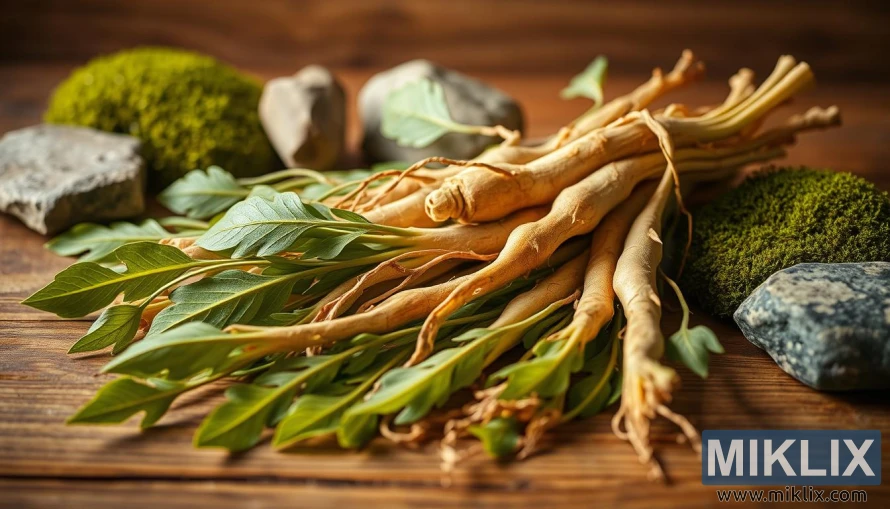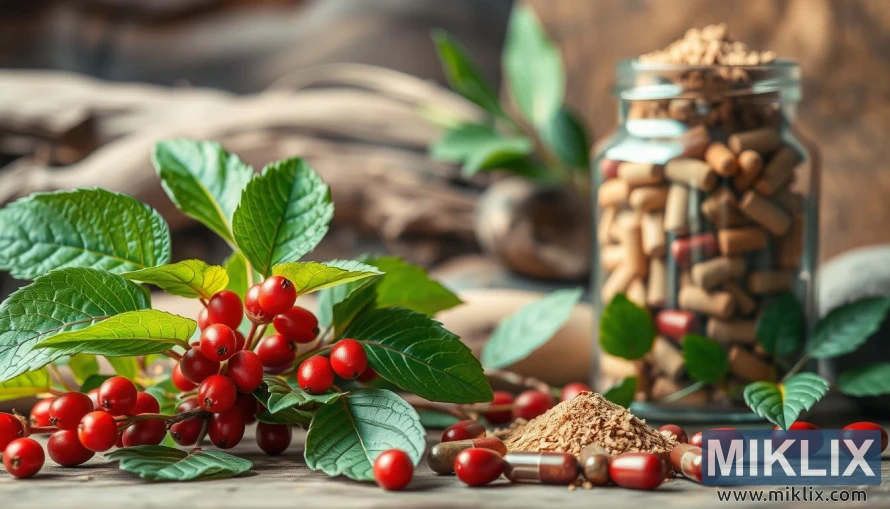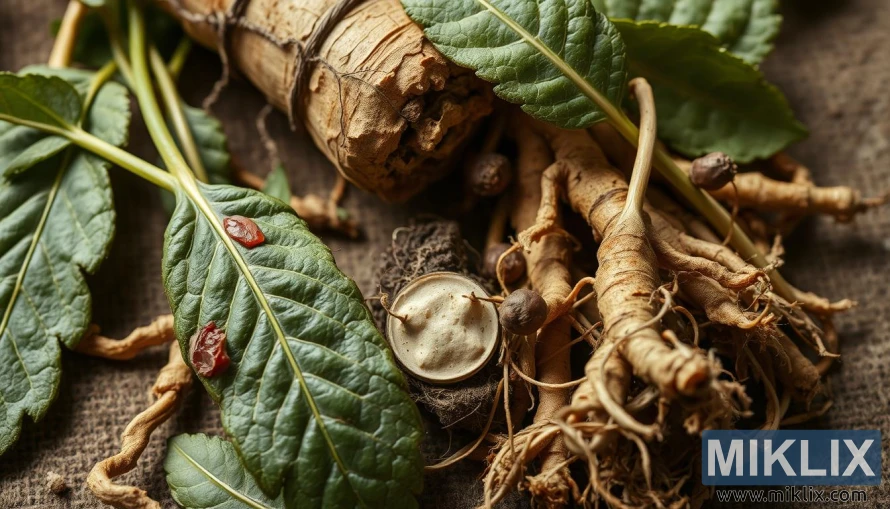Harnessing Ginseng: Nature’s Answer to Stress, Stamina, and Cognitive Clarity
Published: June 18, 2025 at 8:24:19 AM UTC
Ginseng is a highly sought-after herbal supplement, known for its numerous health benefits. It boosts energy, enhances cognitive function, and supports immune health. This has made ginseng supplements increasingly popular in recent years. For centuries, it has been used in traditional medicine, mainly in Asia and North America. Scientific research supports its efficacy, making it a valuable addition to many health regimens. This article explores the various benefits of ginseng. It also delves into the different forms, types, and precautions associated with ginseng supplements. Understanding these aspects can help you make informed decisions about incorporating ginseng into your health routine.

Key Takeaways
- The health benefits of ginseng include improved energy and cognitive function.
- Ginseng supplements have a long history of usage in various cultures.
- Scientific evidence supports the advantages of ginseng for immune health.
- Different types of ginseng offer varied benefits.
- Precautions should be taken when consuming ginseng supplements.
Introduction to Ginseng Supplements
Ginseng supplements are made from the roots of the ginseng plant, mainly from the Panax genus. They come in various forms, such as capsules, powders, teas, and ginseng extract. Each type has its own benefits and ways of being consumed, meeting different needs.
The allure of ginseng dietary supplements stems from their claimed health advantages. Many seek these supplements for their antioxidant and anti-inflammatory effects. These benefits are linked to the active compounds found in the ginseng roots. Knowing about ginseng supplements helps us grasp their historical importance and modern uses.
Historical Use of Ginseng in Traditional Medicine
Ginseng has a rich history in traditional medicine, most prominently in traditional Chinese medicine (TCM). For over 2,000 years, it has been celebrated for its ability to boost vitality and extend life. Its legacy is not just about physical health but also spiritual well-being. Ginseng's use spread beyond China, with cultures in Asia and North America valuing it for health restoration.
In the history of herbal medicine, ginseng played a multifaceted role. It was used to increase energy and reduce stress. Ancient healers saw it as a way to balance the body's energies, making it a key part of holistic treatments. Today, ginseng remains a symbol of wellness, showing its lasting impact on health practices.
Types of Ginseng: Asian vs. American
Ginseng is a well-known herbal supplement, available in two main types: Asian ginseng and American ginseng. Each type has its own set of characteristics and benefits, thanks to their unique compositions.
Asian ginseng, scientifically known as Panax ginseng, is renowned for its stimulating effects. It is often praised for boosting energy and sharpening mental focus. This variety is celebrated for its ability to enhance physical performance and stamina.
On the other hand, American ginseng, or Panax quinquefolius, has a calming effect. It is favored for its stress-relieving properties. This type is known for its adaptogenic qualities, helping the body adapt to stress and achieve a balanced state of mind.
Both Asian and American ginseng contain beneficial compounds, but they may have different health effects. Recognizing the differences between these two types allows individuals to select the one that best suits their health needs.

Active Compounds in Ginseng: Ginsenosides and Gintonin
Ginseng is celebrated for its wide range of health benefits, mainly due to its active compounds. Ginsenosides and gintonin are key players in these benefits.
Ginsenosides, a type of steroidal saponin, are vital for ginseng's adaptogenic effects. They are associated with several health advantages, including:
- Immune system modulation, boosting the body's stress response.
- Neuroprotection, possibly improving cognitive functions.
- Anti-inflammatory effects, helping to reduce chronic inflammation.
Gintonin, on the other hand, is known for its effects on mental clarity and cognitive function. It is believed to enhance synaptic plasticity. This contributes to better memory and brain health.
Research is ongoing to understand how these compounds work within the body. Studying ginsenosides and gintonin could lead to new uses for ginseng. It may also solidify its importance in health and wellness.
Antioxidant Properties of Ginseng
Ginseng has become a focus due to its high antioxidant content. These compounds are vital in fighting oxidative stress in the body. Ginseng antioxidants protect cells from harm caused by free radicals, which can lead to chronic diseases. Studies show that ginseng's antioxidants help reduce inflammation, making it beneficial for those recovering from intense physical activities.
The benefits of ginseng go beyond just antioxidants. Research suggests that ginseng extracts can lessen muscle damage after hard exercise, speeding up recovery. This ability to reduce inflammation is essential for those who regularly engage in physical training or aim to boost their health.
Boosting Immune Function with Ginseng
Research shows that ginseng significantly boosts immune health. It increases the production of immune cells, helping the body fight infections. Studies link ginseng to a lower incidence and severity of common illnesses like colds and respiratory infections.
Ginseng's benefits go beyond preventing minor illnesses. Regular use of ginseng supplements can enhance the immune response. This makes it a valuable ally during cold and flu seasons. Adding ginseng to your daily routine can provide significant support to your body's defenses.

Ginseng for Improved Energy and Focus
Ginseng has become a popular natural remedy for boosting energy levels. Its adaptogenic properties help the body manage stress effectively. This can lead to increased energy, which is vital for those with demanding tasks. Regular use of ginseng not only enhances physical endurance but also sharpens cognitive abilities.
Studies suggest that ginseng can improve focus and mental clarity. The compounds in ginseng enhance cognitive functions, leading to better concentration in challenging situations. Many users experience increased alertness and the ability to handle complex tasks after adding ginseng supplements to their routine.
Potential Benefits of Ginseng for Brain Health
Ginseng has caught the eye for its possible benefits to brain health. Studies suggest it could improve cognitive function and memory, mainly in older adults. This is due to its unique compounds, which may protect the brain.
The neuroprotective effects of ginseng could help manage symptoms of cognitive decline with age. Regular use might enhance daily performance. Research is growing, highlighting ginseng as a promising choice for brain health.
Ginseng and Blood Sugar Management
Recent studies have shed light on ginseng's role in managing blood sugar levels. It appears to improve insulin sensitivity, a key factor in blood sugar control. For those dealing with ginseng diabetes, adding this herb to their regimen could yield substantial health benefits.
Research highlights several important points about ginseng's effect on blood sugar:
- Ginseng can help lower fasting blood sugar levels, which is critical for diabetics.
- The compounds in ginseng may aid in regulating glucose metabolism.
- Regular ginseng consumption could also reduce oxidative stress, benefiting diabetics further.
As interest in natural diabetes treatments grows, ginseng emerges as a promising option. It can serve as a complementary therapy to traditional treatments. Incorporating ginseng into one's health care plan may improve blood sugar management outcomes.
Effects of Ginseng on Erectile Dysfunction
Ginseng has caught the eye for its possible role in treating erectile dysfunction. Studies suggest it may boost sexual health by improving blood flow. This is thought to happen through increased nitric oxide production, which enhances vascular function.
Many people trying ginseng for ED have seen positive results. Key points to consider include:
- Varied responses among users, with some experiencing significant improvements.
- Potential side effects such as headaches or digestive issues.
- The importance of consulting with a healthcare professional before starting any new supplement.
This natural option is an attractive choice for those looking for erectile dysfunction treatment. It offers a non-pharmaceutical solution. As interest in ginseng for ED grows, more research will shed light on its benefits and effectiveness.
Ginseng's Role in Combatting Fatigue
Ginseng has become a topic of interest for its possible role in fighting fatigue, mainly for those with chronic fatigue syndrome. This herbal supplement is known for its ability to reduce tiredness and boost stamina. Studies suggest that ginseng's active compounds can increase energy levels, making it a natural choice for those battling fatigue.
Many people with chronic fatigue syndrome have seen improvements after adding ginseng to their regimen. This adaptogenic herb helps the body handle stress better, leading to increased physical endurance. It enhances energy, making daily tasks easier and improving overall well-being.
Using ginseng as part of a broader strategy to manage fatigue offers a natural remedy for chronic tiredness. Its distinct properties make it an attractive option for anyone seeking to elevate their energy and tackle the root causes of fatigue.
Potential Role of Ginseng in Cancer Prevention
Research suggests that ginseng could help prevent certain cancers by reducing their risk. This is mainly due to its ability to fight oxidative stress and inflammation. Studies point to ginsenosides, compounds in ginseng, as key players. They may stop abnormal cells from growing.
Ginseng's benefits could also extend to aiding in cancer treatment. Adding ginseng to a holistic wellness plan might improve health outcomes. Yet, more extensive studies are needed to solidify these findings. They will help us grasp the underlying mechanisms.

Forms of Ginseng: From Tea to Capsules
Ginseng comes in various forms, catering to different tastes and health needs. Each form has its own benefits and ways of consumption. This allows users to pick what suits their lifestyle best.
- Ginseng Tea: This form is loved for its soothing and flavorful taste. It's made by steeping ginseng roots or extracts in hot water. This creates a refreshing drink perfect for any time of day.
- Ginseng Capsules: For those looking for ease, ginseng capsules are a convenient choice. They contain a precise amount of ginseng extract. This makes it simple to add to your daily routine without any fuss.
- Ginseng Extracts: Extracts are a concentrated version of ginseng. They can be added to drinks or taken straight. This form is popular for its strength and quick absorption by the body.
- Ginseng Powders: These powders can be blended into smoothies, yogurt, or baked goods. They offer flexibility in how ginseng can be enjoyed. The powdered form keeps many of the root's properties while being easy to mix into meals.
When choosing a ginseng form, think about your personal preferences, lifestyle, and health goals. Ginseng tea offers a comforting experience, while ginseng capsules are hassle-free for supplementing.
Recommended Dosage and Administration of Ginseng
Finding the right ginseng dosage depends on individual needs and health goals. Studies suggest daily intake ranges from 200 mg of standardized extract to 0.5-2 grams of whole ginseng root. Starting with a lower dose is wise to gauge tolerance and avoid side effects.
Consider the ginseng form, health conditions, and medications when administering ginseng. Most supplements come with clear dosage guidelines. Regular use can boost energy and overall health.
Precautions and Possible Side Effects of Ginseng
Ginseng is widely used for its health benefits. Yet, it's important to note certain precautions. Side effects can include insomnia, headaches, stomach issues, and skin rashes. These reactions can differ from person to person.
It's wise to use ginseng for no longer than three months straight. Longer use can lead to more side effects. Always talk to a healthcare provider before starting ginseng, if you have health issues or are on medications.
Knowing your health situation is key to safe ginseng use. This knowledge helps in avoiding risks while enjoying its benefits. It's a smart way to use this powerful herbal supplement.

Interactions with Medications
Ginseng, known for its health benefits, can interact with medications, posing risks. This is true for those taking blood thinners, as ginseng may increase bleeding risks. It's essential for those considering ginseng to understand these interactions.
For individuals managing blood sugar levels, ginseng can interact with diabetes medications. This interaction may lead to low blood sugar if not monitored. It's vital for patients to discuss their ginseng use with healthcare providers to manage their conditions effectively.
Antidepressants may also interact negatively with ginseng, affecting both its effectiveness and side effects. These interactions highlight the need to consult with a medical professional before starting ginseng.
Understanding ginseng drug interactions is key to managing risks during treatment. Regular consultations with healthcare professionals are necessary to ensure safe use of ginseng in personal health strategies.
Conclusion
Ginseng, an ancient herb, has stood the test of time in health practices. Its supplements offer numerous benefits, such as boosting energy, improving cognitive function, and supporting the immune system. This summary showcases the herb's diverse uses, highlighting its importance across cultures and centuries.
Research into ginseng's active compounds is ongoing, reinforcing its value in supplements. Our conclusion is that ginseng can be a valuable addition to health regimens. Yet, users must consider proper dosage and any interactions with medications. Understanding these aspects is key to safely enjoying ginseng's benefits.
Ginseng's historical significance and ongoing scientific validation make it a notable choice for holistic health. As research progresses, we can expect more insights into ginseng's remarkable properties.
Further Reading
If you enjoyed this post, you may also like these suggestions:
- Guava Gains: How One Fruit Can Transform Your Health
- Fuel Your Microbiome: The Surprising Benefits of Inulin Supplements
- Beans for Life: The Plant-Based Protein with Perks
